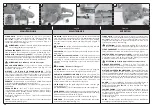
24
41
42
43
44
Italiano
English
Français
ARRESTO MOTORE
STOPPING THE ENGINE
ARRET DU MOTEUR
ARRESTO MOTORE
Rilasciare la leva acceleratore portando il motore al minimo
(B, Fig. 41). Spegnere il motore, riportando l’interruttore
di massa (C) nella posizione di STOP. Non appoggiare la
motosega sul terreno se la catena è ancora in moto.
RODAGGIO CATENA
La regolazione deve sempre essere fatta a catena fredda.
Fare girare la catena manualmente, lubrificandola con olio
supplementare (Fig. 42). Avviare il motore per qualche
minuto a velocità moderata, controllando il regolare
funzionamento della pompa dell’olio (Fig. 43). Arrestare il
motore e regolare la tensione della catena. Avviare il motore
praticando qualche taglio in un tronco. Arrestare di nuovo
il motore e ricontrollare la tensione. Ripetere l’operazione
finchè la catena non ha raggiunto il suo massimo
allungamento. Non toccare il terreno con la catena stessa.
ATTENZIONE - Non toccare mai la catena con il
motore in moto.
STOPPING THE ENGINE
Release the throttle lever and let the engine return to idle.
(B, Fig. 41). Turn off the engine, putting the ON/OFF switch
(C) in the STOP position. Do not put the chain saw on the
ground when the chain is still moving.
BREAKING-IN THE CHAIN
New chains will stretch and must be tightened frequently.
Tension adjustment should only be made when the chain is
cool. First, turn the chain and lubricate it with additional oil
(Fig. 42). Then start the saw and allow it to run at moderate
speed, checking that the oil pump is working properly
(Fig. 43). Stop the engine and adjust the chain tension. Start
the saw again and make a few cuts in a trunk to heat up the
chain. Stop the engine, allow the chain to cool and adjust
again. Repeat this process until the chain retains proper
tension. Do not touch the ground with the chain.
WARNING - Never touch the chain while the motor is
running.
ARRET DU MOTEUR
Lâchez le levier de l'accélérateur et laissez le moteur
tourner au ralenti (B, Fig.41). Arrêtez le moteur en replaçant
l’interrupteur de masse (C) en position STOP. Ne posez pas la
tronçonneuse sur le terrain si la chaîne tourne encore.
RODAGE DE CHAINE
Effectuez toujours le réglage lorsque la chaîne est froide.
Faites tourner la chaîne à la main en la lubrifiant avec de
l’huile supplémentaire (Fig.42). Mettez le moteur en marche
et faites tourner la chaîne à un régime moteur moyen en
contrôlant le bon fonctionnement de la pompe de l’huile
(Fig.43). Arrêtez le moteur, réglez la tension de la chaîne.
Redémarrez le moteur, effectuez quelques coupes sur
un tronc. Arrêtez de nouveau le moteur et recontrôlez la
tension. Recommencez l’opération jusqu’à ce que la chaîne
soit au maximum de son relâchement. Ne touchez pas le
terrain directement avec la chaîne.
ATTENTION - Ne touchez jamais á la chaîne si le
moteur tourne.
SISTEMA ANTIGHIACCIO
ICE DEVICE SYSTEM
SYSTEME ANTIGIVRE
Con temperature inferiori a 0°C, posizionare il cursore (A,
Fig.44) sulla posizione invernale. Il simbolo della posizione
invernale Fig.44, deve rimanere sulla destra, non coperto
dalla guarnizione. In questo modo oltre all’aria fredda viene
anche aspirata aria calda proveniente dal cilindro e quindi
non si forma ghiaccio all’interno del carburatore.
Con temperature superiori a +10°C risistemare il cursore
(A, Fig.45) nella posizione estiva. In caso contrario si
potrebbero verificare anomalie funzionali del motore
per surriscaldamento.
In the event of temperatures below 0°C, move the cursor
(A, Fig. 44) to the winter position. The winter symbol (Fig. 44)
should remain on the right, not covered by the gasket. In this
way heated air from the cylinder is also taken in, preventing
thus the formation of ice inside the carburettor.
When the temperature rises above +10°C, move the
cursor (A, Fig. 45) to the summer position. Failure to
reset this parameter could impair motor performance
due to overheating.
Avec une température inférieure à 0°C, placer le curseur
(A, Fig.44) sur la position hiver. Le symbole de la position
hiver Fig.44, doit rester sur la droite, sans être couvert par
le joint. De cette façon, l'air froid tout comme l'air chaud
provenant du cylindre sont aspirés. Il n'y a donc pas de
formation de glace à l'intérieur du carburateur.
Avec une température supérieure à +10°C, remettre le
curseur (A, Fig.45) en position été. Dans le cas contraire,
le moteur pourrait présenter des dysfonctionnements
dus à une surchauffe.
















































